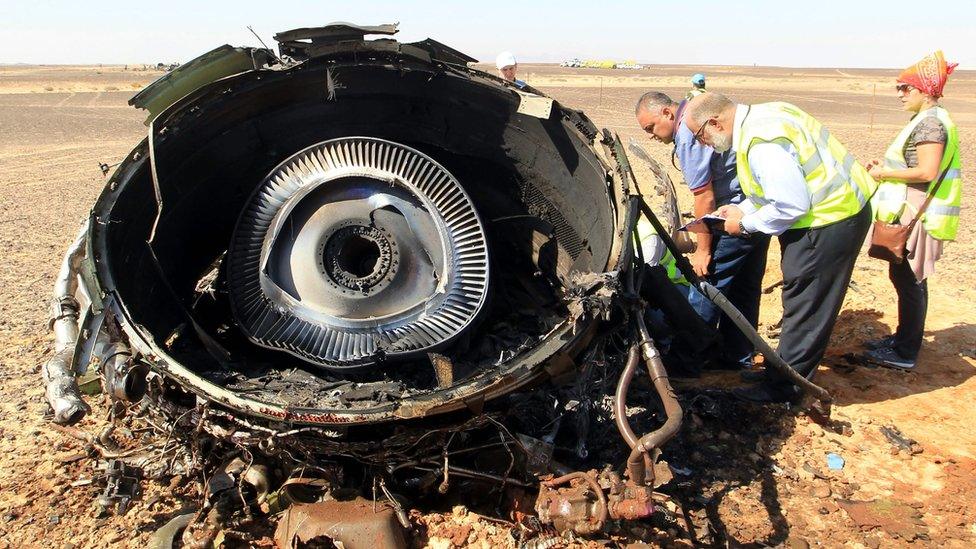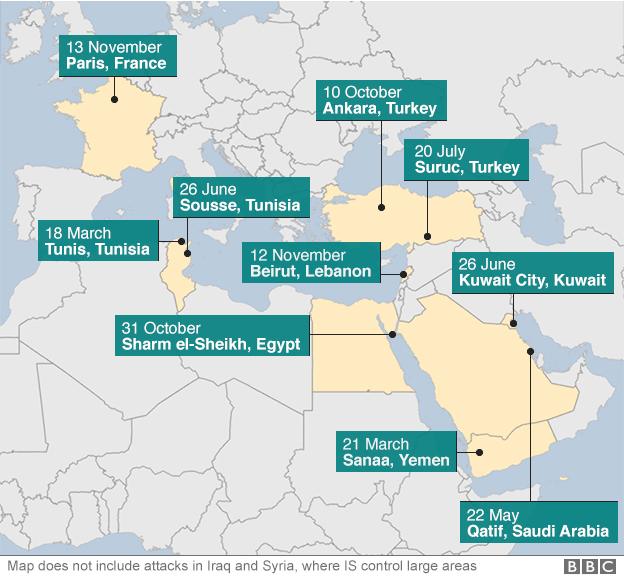Russia plane crash: 'Terror act' downed A321 over Egypt's Sinai
- Published

Egyptian and Russian crash experts examined the debris in the Sinai desert
Russia's security chief says an act of terror brought down the Russian A321 airliner in Egypt last month, killing all 224 people on board.
"Traces of foreign explosives" were found on debris from the Airbus plane, FSB chief Alexander Bortnikov told Russian President Vladimir Putin.
Mr Putin vowed to "find and punish" those behind the attack over the Sinai peninsula. A branch of so-called Islamic State said it downed the plane.
Nearly all the dead were Russians.
Mr Bortnikov said a bomb had been planted on board the Metrojet plane, equivalent to up to 1kg of TNT. The Kremlin website, external carried a transcript of the meeting.
The bomb shattered the plane mid-air on 31 October, he said, "which explains the wide dispersal of fuselage pieces".
Mr Putin said that Russia must hunt those responsible "indefinitely, find out who the individuals were".
"We'll look for them everywhere, wherever they are hiding. We'll find them in any corner of the planet and punish them."
Russian plane crash: What we know
Russia has offered a $50m (£33m) reward for information on the Sinai plane attackers.
Sinai Province, a branch of Islamic State (IS), said in a statement on 31 October that it had destroyed the plane because of Russian air strikes in Syria.
IS also said it was responsible for the multiple shootings and bombings in Paris on Friday night which killed 129 people and wounded hundreds more.
Heavier Russian raids
Most of the A321 passengers were Russian tourists flying home from the Red Sea resort of Sharm el-Sheikh.
Metrojet is the brand name of Kogalymavia, an airline based in western Siberia.


Mr Putin said that Russia's air strikes in Syria "must not only be continued - they must be intensified so that the criminals understand that retribution is inevitable".
Russian warplanes are supporting Syrian government forces against various rebel groups, including IS and other Islamists.
Russia's military commanders were also at the meeting with Mr Putin and the Federal Security Service (FSB) chief.

Egypt president under pressure - BBC's Orla Guerin in Cairo:
The Russian statement that a bomb ripped apart the plane will surprise few, but it will be deeply damaging to Egypt's image, its tourist industry and its president, Abdul Fattah al-Sisi.
The former army chief sold himself to the nation, and the world, as a leader who could bring order after chaos.
Instead, a virulent branch of Islamic State has been able to take root on his own doorstep, in the Sinai peninsula - in spite of a major military offensive.
Even after the crash, in a BBC interview, President Sisi claimed - implausibly - to have "full control" over Sinai. Instead, attackers were able to slaughter more than 200 Russian tourists.
The last thing a Middle Eastern strongman can afford is to look weak. But the wreckage of Flight 9268 is proof of President Sisi's vulnerability, and of the growing strength and reach of Islamist extremists in the Arab world's most populous nation.

Mr Putin was speaking after separate meetings at the G20 summit in Turkey, with US President Barack Obama on Sunday, and UK Prime Minister David Cameron on Monday.
The Syrian conflict was the focus of their talks. Mr Cameron pressed Mr Putin to direct air strikes against IS, and not at moderate rebel groups fighting President Bashar al-Assad's troops.
Commenting later on the G20 talks, Mr Cameron said everybody recognised the need for compromise and Russian opinion was changing.
"I think there are some signs, some signs, that they are focusing more on Isil (IS) but we need to see that continued," the prime minister said.
The Sinai Province militants have operated in northern Sinai for two years, attacking Egyptian security forces, hundreds of whom have died in the violence.

Bloodiest attacks in 2015 linked to 'Islamic State'

13 Nov - Paris, France Gunmen and suicide bombers kill at least 129 people.
12 Nov - Beirut, Lebanon Suicide bombers kill at least 43 people.
31 Oct - Sharm el-Sheikh, Egypt Plane crashes killing all 224 on board. Russia says a bomb caused the crash and an IS affiliate says it was responsible.
10 Oct - Ankara, Turkey Suicide bombers kill 102 people at peace rally. Turkey blames IS, but no group claims the attack.
20 Jul - Suruc, Turkey Suicide bomber kills 33 people.
26 Jun - Sousse, Tunisia Gunman kills 38 people, mostly British tourists.
26 Jun - Kuwait City, Kuwait Suicide attack kills at least 27 people.
22 May - Qatif, Saudi Arabia Two suicide bombs kill at least 21 people.
21 Mar - Sanaa, Yemen Suicide bombings kill at least 137 people.
18 Mar - Tunis, Tunisia Gunmen kill 19 people, mostly foreign tourists.